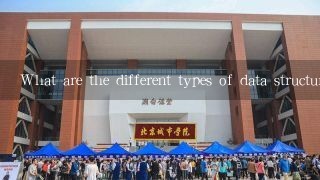What are the different types of data structures and algorithms?

Data Structures
- Arrays: A collection of elements of the same data type stored in contiguous memory locations.
- Linked Lists: A collection of nodes linked together by pointers.
- Stacks: A LIFO (last-in, first-out) data structure where elements are added to the top and removed from the top.
- Queues: A FIFO (first-in, first-out) data structure where elements are added to the rear and removed from the front.
- Trees: A hierarchical data structure that can be sorted.
- Graphs: A collection of nodes and edges that connect them.
Algorithms
- Sorting algorithms: Algorithms for sorting data, such as bubble sort, insertion sort, and merge sort.
- Searching algorithms: Algorithms for finding specific data in a data structure, such as binary search and linear search.
- Graph algorithms: Algorithms for traversing and analyzing graphs, such as breadth-first search and depth-first search.
- Dynamic programming algorithms: Algorithms that solve problems by breaking them down into smaller subproblems.
- Backtracking algorithms: Algorithms that explore all possible solutions to a problem systematically.
- Search algorithms: Algorithms that use a specific search strategy to find a target value in a data structure.
-
Sorting algorithms: Algorithms that use a specific sorting criterion to order a data structure.



















































































































![出版专业职业资格考试的初级辅导书和中级辅导书有什么区别吗?区别大吗?看着名字都一样,取得出版专业初级职业资格者,可以聘任( )职务。[2008年真题] 出版专业职业资格考试的初级辅导书和中级辅导书有什么区别吗?区别大吗?看着名字都一样,取得出版专业初级职业资格者,可以聘任( )职务。[2008年真题]](https://www.cdmbedu.com/cache/s/images/2023-02/28a7DuTPjGErwaTCxrY8Mk23DNznigo2.jpg)




